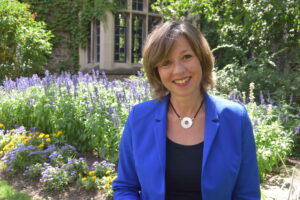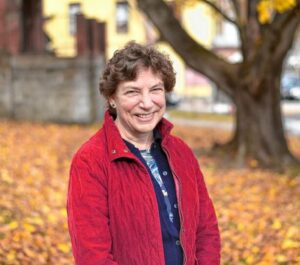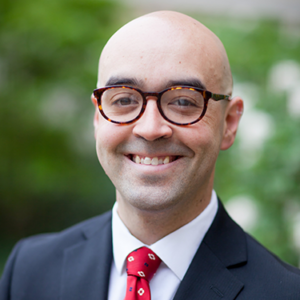
Climate Trauma and Practices Toward Hope
A Chaplaincy Conversation
Occurred on Tuesday, February 25, 2025
As chaplains and spiritual caregivers, how do we understand the ways in which climate change and climate crisis interacts with and aggravates other traumas? According to Dr. Pamela McCarroll, climate trauma — an emerging category — is unique in that trauma experienced from climate anxiety can compound existing traumas, especially since it tends to be continually present and growing rather than a passing occurrence. Individuals and communities experiencing climate trauma do so on many levels — physical, psychological, and spiritual.
In these times of increasing instability and climate devastation, chaplains in every sector — higher education, hospital, prison, military, movement, and more — are offering spiritual care to individuals and communities who are experiencing trauma as a result of the climate crisis. Such work requires a unique set of skills and capacities for presence. As this area of chaplaincy is evolving rapidly, how do we as spiritual caregivers ground ourselves in trauma-informed practice that is spacious enough to meet a wide range of needs and situations while also caring for ourselves?
In this special online conversation, professor and spiritual care practitioner Dr. Pamela McCarroll joined us to examine climate trauma as a framework for interpreting human tendencies toward fight, flight, and freeze reactions in the face of the ubiquitous threat of the climate crisis. And as a spiritual caregiver, she also invited us to consider trauma-informed practices that lean toward hope for the living of these days.
Download a flyer for this event
View the conversation, recorded on February 25, 2025 below:
Meet Our Presenter
 Pamela McCarroll serves as Vice Principal and the Jane and Geoffrey Martin Chair of Practical Theology at Emmanuel College of Victoria University in the University of Toronto. She is a Certified Supervisor-Educator with the Canadian Association for Spiritual Care (CASC/ACSS). Her research focuses on climate crisis and practical theology, especially related to climate trauma and practices of hope. She also publishes research on chaplaincy and spiritual care practice.
Pamela McCarroll serves as Vice Principal and the Jane and Geoffrey Martin Chair of Practical Theology at Emmanuel College of Victoria University in the University of Toronto. She is a Certified Supervisor-Educator with the Canadian Association for Spiritual Care (CASC/ACSS). Her research focuses on climate crisis and practical theology, especially related to climate trauma and practices of hope. She also publishes research on chaplaincy and spiritual care practice.
Meet Our Hosts
 The Rev. Alison Cornish serves as the Coordinator of the Chaplaincy Initiative at the BTS Center. Alison spent the first half of her professional life working as an historic preservationist and architectural historian, primarily in New England and on Long Island, NY. After 20 years of work with museums, municipalities and nonprofit organizations, Alison attended Andover Newton Theological Seminary in response to a felt sense of call directly from Earth to address what is it that we are doing in our daily lives and habits that is destroying the planet that we inhabit. Following CPE, field education in interfaith work and parish ministry, and ordination in the Unitarian Universalist tradition, Alison served congregations on Long Island while also embarking on studies with the Buddhist teacher Joanna Macy and Dominican sister Miriam McGillis. Alison became a GreenFaith Fellow in 2013, and a Climate Reality Project presenter in 2017. She has served as Senior Director of Programs at Partners for Sacred Places, Executive Director of Pennsylvania Interfaith Power & Light, Director of Seminary and Congregational Initiatives at Interfaith Philadelphia, and as the Affiliated Community Minister at First Unitarian Church, Philadelphia. Alison’s facilitation work includes the Work That Reconnects, training-the-trainers for Civil Conversations, group practice of Nonviolent Communication, and the curriculum “Healthy Congregations.” A Program Consultant for the BTS Center since 2021, her work has focused on ecological and climate grief, religious imagination, and chaplaincy in a climate-changed world. Alison and her husband Pat live in Shelburne Falls, Massachusetts, on the unceded lands of the Nipmuc and Pocumtuc peoples, in the watershed of the Connecticut River. When not working, Alison can be found along, on, and in, a local natural body of water, currently the Deerfield River.
The Rev. Alison Cornish serves as the Coordinator of the Chaplaincy Initiative at the BTS Center. Alison spent the first half of her professional life working as an historic preservationist and architectural historian, primarily in New England and on Long Island, NY. After 20 years of work with museums, municipalities and nonprofit organizations, Alison attended Andover Newton Theological Seminary in response to a felt sense of call directly from Earth to address what is it that we are doing in our daily lives and habits that is destroying the planet that we inhabit. Following CPE, field education in interfaith work and parish ministry, and ordination in the Unitarian Universalist tradition, Alison served congregations on Long Island while also embarking on studies with the Buddhist teacher Joanna Macy and Dominican sister Miriam McGillis. Alison became a GreenFaith Fellow in 2013, and a Climate Reality Project presenter in 2017. She has served as Senior Director of Programs at Partners for Sacred Places, Executive Director of Pennsylvania Interfaith Power & Light, Director of Seminary and Congregational Initiatives at Interfaith Philadelphia, and as the Affiliated Community Minister at First Unitarian Church, Philadelphia. Alison’s facilitation work includes the Work That Reconnects, training-the-trainers for Civil Conversations, group practice of Nonviolent Communication, and the curriculum “Healthy Congregations.” A Program Consultant for the BTS Center since 2021, her work has focused on ecological and climate grief, religious imagination, and chaplaincy in a climate-changed world. Alison and her husband Pat live in Shelburne Falls, Massachusetts, on the unceded lands of the Nipmuc and Pocumtuc peoples, in the watershed of the Connecticut River. When not working, Alison can be found along, on, and in, a local natural body of water, currently the Deerfield River.
 Michael Skaggs, PhD is Director of Programs of the Chaplaincy Innovation Lab, overseeing the Lab’s education and networking initiatives as well as public relations. He is the host and producer of the Lab’s webinar series and editor of the Lab’s eBook series and newsletter.
Michael Skaggs, PhD is Director of Programs of the Chaplaincy Innovation Lab, overseeing the Lab’s education and networking initiatives as well as public relations. He is the host and producer of the Lab’s webinar series and editor of the Lab’s eBook series and newsletter.
Trained at the University of Notre Dame as a historian of American religion, Michael has a particular interest in interfaith dialogue and has served in innovative theological education programs. His work has appeared in Sociology of Religion, International Journal of Maritime History, American Catholic Studies, U.S. Catholic Historian, Books & Culture, and elsewhere. He previously served as Communications Director for Transforming Chaplaincy.
Meet The Chaplaincy Innovation Lab
 The Chaplaincy Innovation Lab (CIL), based at Brandeis University, launched in October 2018 to bring chaplains, theological educators, clinical educators and social scientists into conversation about the work of chaplaincy and spiritual care. As religious and spiritual life continues to change, the CIL sparks practical innovations that enable chaplains to nurture the spirits of those they serve and reduce human suffering.
The Chaplaincy Innovation Lab (CIL), based at Brandeis University, launched in October 2018 to bring chaplains, theological educators, clinical educators and social scientists into conversation about the work of chaplaincy and spiritual care. As religious and spiritual life continues to change, the CIL sparks practical innovations that enable chaplains to nurture the spirits of those they serve and reduce human suffering.
Meet The BTS Center
 With roots dating back to 1814, The BTS Center is a private operating foundation in Portland, Maine, building on the legacy of the former Bangor Theological Seminary. Today The BTS Center seeks to catalyze spiritual imagination, with enduring wisdom, for transformative faith leadership. Guided by the vision of human hearts renewed, justice established, and creation restored, The BTS Center offers programs of spiritual and vocational formation — workshops and retreats, learning cohorts, courses, public conversations, and projects of applied research — that aim to cultivate and nurture spiritual leadership for a climate-changed world.
With roots dating back to 1814, The BTS Center is a private operating foundation in Portland, Maine, building on the legacy of the former Bangor Theological Seminary. Today The BTS Center seeks to catalyze spiritual imagination, with enduring wisdom, for transformative faith leadership. Guided by the vision of human hearts renewed, justice established, and creation restored, The BTS Center offers programs of spiritual and vocational formation — workshops and retreats, learning cohorts, courses, public conversations, and projects of applied research — that aim to cultivate and nurture spiritual leadership for a climate-changed world.

